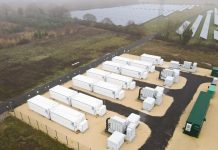
Inertia in the GB power system will become far more valuable according to the head of the system operator, Fintan Slye.
“Inertia will become much more important in the years to come,” said Slye. “I think today it is taken for granted.”
He suggested an inertia market will be required to deliver the necessary volumes as traditional sources – such as the spinning turbines of large power stations – are forced off stream.
“Inertia is at the heart of everything we do,” he said. “We need inertia, so let’s get a market-based solution for that.”
Flex is “huge” for net zero
Speaking at Aurora’s battery storage and flexibility conference, Slye underlined that “flexibility is one of the biggest opportunities” as the UK attempts to decarbonise its economy.
“If you look at all the key challenges we need to solve [to reach net zero], flexibility becomes the key thing to unlocking [all of them],” said Slye. “So the opportunity is huge.”
Earlier this year, National Grid ESO outlined plans to run the power system entirely on carbon-free sources when possible. Slye said it was indicative of how far the public mood has shifted that the system operator is now being asked whether that target is sufficiently ambitious.
“The narrative has most definitely changed and we’ll continue to look whether we can push harder, faster and whether it is appropriate to do that,” he said.
However, he said it is down to government to set policy that incentivises lower carbon forms of generation. Currently, National Grid’s control room, he said, makes its decisions based on economics, not carbon emissions.
Blackouts
Slye said the 9 August blackouts have “pushed forward” discussions around appropriate levels of resilience and its value.
“You can carry large amounts of additional reserve, but consumers have to pay… So what is the right balance; affordability is a big issue, versus the level of resilience people expect.”
However, Slye also suggested that the blackout had raised broader questions about the resilience of other critical infrastructure – and its ability to “ride though” events as heat and transport are electrified.
On calls for SO offload…
While Labour and others have called for the SO function to be taken away from National Grid, Slye suggested the firm is far from keen to offload the role and warned those considering further separation “not to underestimate the scale of disruption” such an approach would entail.
Related stories:
National Grid launches Mersey reactive power tender
National Grid signs deal to measure inertia
National Grid: Two generators cause big frequency drop
National Grid outlines plans to go 100 per cent renewables by 2025
Follow us at @EnergystMedia. For regular bulletins, sign up for the free newsletter.



